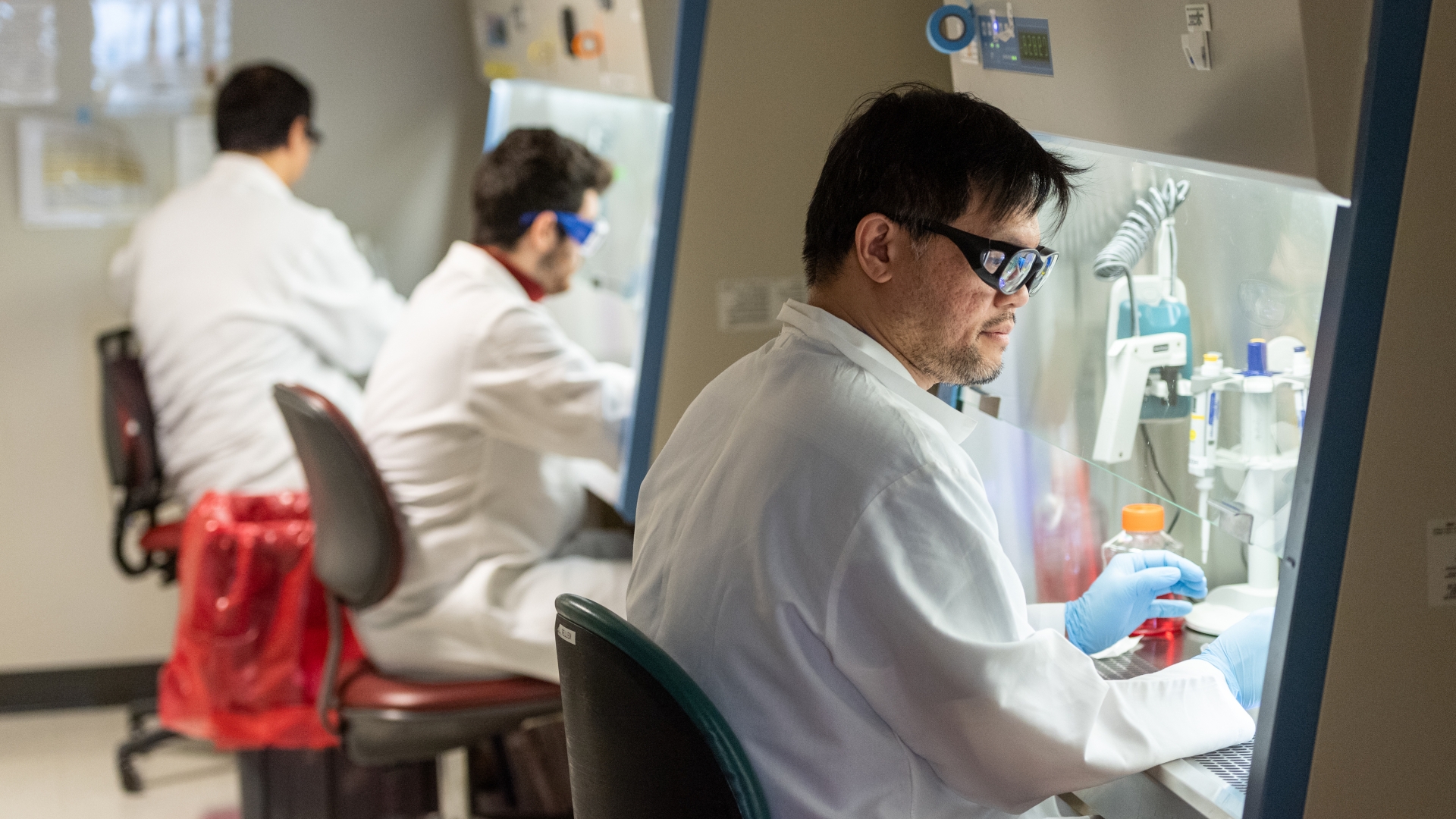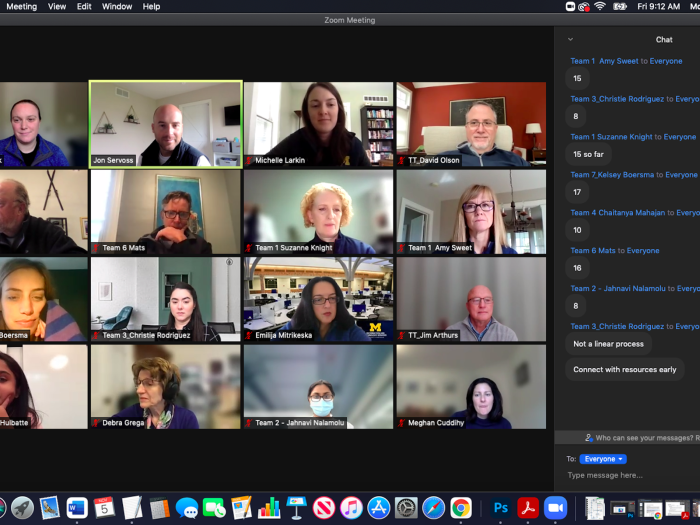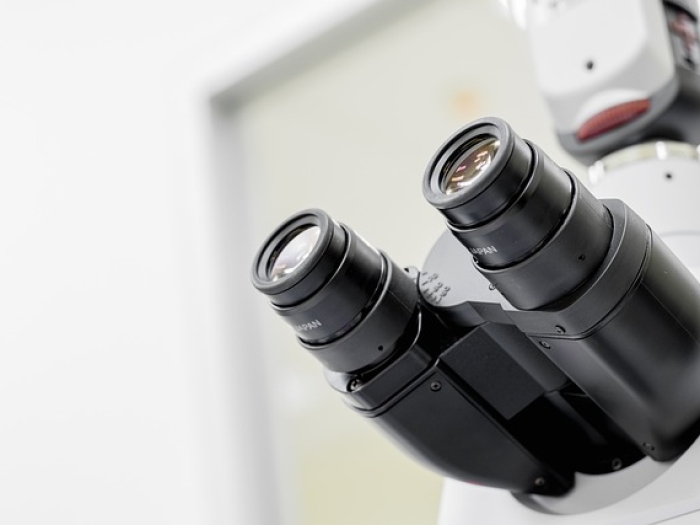Learn more about the wide variety of processes and units facilitating research behind the scenes.

Are you just starting at Michigan Medicine? Clicking on each green "station" of the New Faculty Route Map below displays helpful hints and links to resources you might need in your first three months at the University of Michigan. Once you're further along, we encourage you to check out the larger Research Project Route Map, which points to even more available resources.
While exploring the resources above and connecting with your department’s research administrator will start you on the right path, sometimes the most helpful advice comes from a colleague. The sections below contain helpful reminders, tips, and additional links from veteran PIs, lab managers, and research administrators to assist in navigating available resources at the university.
Navigation tip: If a selected link does not work, it may be an access issue. Remember to login using Duo, or contact your department’s research administrator for assistance.
Tips from a Principal Investigator
"There are two ways to start your lab. You invest in hiring an experienced lab manager who can help you with the business side, or you can hire a technician who can work on the science and the data, and then YOU manage administrative aspects. Which way is the best way to go? My research involves some very intensive labor, so I hired a technician and I often work on administrative tasks after hours. If you're a young investigator, there’s a lot of value in taking on the administrative tasks that will help you understand the regulatory and business requirements of running a lab, knowing the lay of the land. Do that before you start delegating."
Tips from a Lab Manager
"The staff at the International Center are fantastic, but you need to allow time! Hiring a foreign national can sometimes take months! Also, if you have foreign staff who need help finding housing, the Global Reach Office is very helpful.
If you are considering hiring a work-study student, think ahead! Students are often committed for work-study positions as far as six months in advance. For instance, if you wish to hire someone for the fall term, you'll want to post the job on the Student Employment website the spring before. Also, this site allows you to save a job description over time. If you hire a work-study student in the fall of one year, you can simply repost the exact same job the next year if needed.
As an academic, you owe it to your student employee to orient them to the lab by the book. Because of this, they can be time-intensive; don’t hire more than you can handle. Remember your lab is a business.
Need to hire a temp? Pay a student (who doesn't have work-study funding) for a one-off project? PeoplePay is the right tool. Keep in mind that if you are considering hiring an existing U-M employee to "moonlight" as a temp or as a contract worker, that person CANNOT work for you if the work/project falls within the scope of their "day job." For instance, if their day job involves preparing samples for analysis in a U-M colleague's lab, you cannot hire them as a contractor or temp to prepare samples for you in YOUR lab on the weekends.
Will you expect to have guest researchers or adult volunteers in your lab or space? Bringing temporary staff or volunteers on board can be complicated, especially because of potential liability issues. Everyone, including guests, will have minimum PEERRS training requirements, which require Level 1 (Kerberos) login access. This guest access is called “Sponsored.” If your guest or volunteer will be in-person, they’ll also need an Mcard for building access.
For help with volunteers, go to the Pre-Approved Volunteers section of the Michigan Medicine Volunteer Services website. Your potential volunteer will need to complete and submit a Pre-Approved Application. This application contains a section called “Placement Information,” where your volunteer will be required to enter info like department name, address, and supervisor. Once submitted, Volunteer Services will reach out to the listed supervisor to facilitate completing the process. If you still have questions, just contact Volunteer Services at 734-936-4327 or [email protected]."
Tips from a Research Administrator
"Have you talked to the team member in your Department who is responsible for Human Resources? If you don't know who that is, ask your Department Administrator. Take a stab at completing the Position Description Form before going to your HR person. You'll need to know your Department ID to complete this form, and the Career Path Navigator will help you complete fields on this form like "Market Title" and "Working Title."
"The Career Path Navigator offers the official U-M HR descriptions for various job roles. Go to "Mapping to the Market" and then click "Research." This will then display "Career Bands" (Categories) and "Job Roles," which can help you determine the possible descriptions for positions you need to fill. There's no accessible web resource for helping determine pay grades for the Job Roles listed on this site - you'll need to talk to your Department HR person, or submit a request to the HR Solutions Center, for salary ranges. Regarding the HR Solutions Center - before you enter a request via a "Case Management Form," check to see if your Department HR person can complete your task via a Personnel Action Request (PAR). Additionally, you will need your employee ID # in order to submit a request via this form."
| Helpful Links for Hiring |
| HIRING STAFF |
| U-M CAREER PATH NAVIGATOR |
| U-M HR SUPERVISOR RESOURCES |
| HR SOLUTIONS CENTER |
| PEOPLEPAY |
| STUDENT EMPLOYMENT OFFICE |
| INTERNATIONAL CENTER |
Tips from a Lab Manager
"If they will be working off hours, remember to double-check to make sure the badge (M-Card) for a new staffer is programmed to allow them in the lab building after hours. There are various locations in buildings on campus where you can replace or renew your badge, and remember that your team member must have an ID Request and Change Form signed by a supervisor."
Tips from a Research Administrator
"In addition to your level 1 (kerberos) and level 2 passwords, many tools such as M-Pathways require "two-factor authentication" which is provided using Duo."
| Helpful Links for Onboarding |
| NEW FACULTY |
| ONBOARDING CHECKLIST |
| M-CARD |
| TWO-FACTOR AUTHENTICATION (DUO) |
| MEDICAL SCHOOL INTRANET |
| MEDICAL SCHOOL POLICIES |
| U-M STANDARD PRACTICE GUIDE |
Tips from a Principal Investigator
"Work Connections is the U-M service that provides guidance on short-term disability or illness.
Tackling how a health issue for a staff member - or yourself - impacts work is never easy. Find a colleague who has been through something similar; they can offer insight into the university's processes and policies for short and long-term disability."
Tips from a Research Administrator
"M-Pathways is the overarching web tool that encompasses both the HR Management System and the Financials for managers. The HR tool hosts dashboards, employee pay rates and hours, vacation, leave, etc.
Every year, staff must certify their effort in the "Employment Information" section of Wolverine Access. Make sure each of your staff members know the percentage breakdown on how their effort is funded.
Have you talked to the team member in your department who is responsible for payroll? If you don't know who that is, ask your Research Administrator or your Department Administrator."
| Helpful Links for Management |
| M-PATHWAYS HUMAN RESOURCES |
| EFFORT REPORTING |
| PAYROLL |
| PERFORMANCE MANAGEMENT |
| DIVERSITY, EQUITY & INCLUSION |
| EMPLOYEE ASSISTANCE PROGRAM |
| WORK CONNECTIONS |
Tips from a Principal Investigator
"The Faculty Affairs professional development courses on lab culture have been very useful, helping me make sure that my lab policies are aligned with the university’s culture and objectives.
Don't ignore the emails from Cornerstone Learning that remind you that certain training is due, and save them - you may need them later."
Tips from a Research Administrator
"The Office of Research and Sponsored Projects on central campus periodically offers classes for research administrators, as well as other professional development resources, through their Navigate Program."
| Helpful Links for Career Development & Training |
| FACULTY CAREER DEVELOPMENT |
| CORNERSTONE LEARNING |
| R01 BOOT CAMP |
| MICHR EDUCATION & TRAINING |
| MICHR MENTORING |
| FAST FORWARD MEDICAL INNOVATION COURSES |
| LINKEDIN LEARNING |
Tips from a Principal Investigator
"When thinking about possible funding opportunities, give care to understanding your scope and finding a good fit. Sponsors can tell when your budget fits your aims - and when it doesn't!
Not yet ready to submit a full proposal? Need more preliminary data? Use Competition Space to look for pilot funding opportunities.
If you’re working through ideas, spend some preliminary time on explaining your scientific goals to others, so it becomes easier to write in your proposal. Talking through your science and receiving feedback will bring clarity to your proposal.
As part of your pre-proposal discovery process, check out Michigan Experts if you're looking for potential collaborators on campus.
Strong post-award financial management is dependent on having a good financial plan in the proposal. Work with staff who will manage the funds later, to make sure you’ve taken into consideration all the costs that might be required for the project.
Be careful what you promise, because you’ll have to deliver! For instance, if you say you’ll cover a certain cost that the sponsor does not – you’ll be held to that later."
Tips from a Research Administrator
"Does your department have a Grant Specialist? If yes, contact them when you're getting started with a grant proposal. CLICK HERE for the list of departmental grant advisors. The Grant Services and Analysis team also maintains a comprehensive Post-Award page with information and links to resources across campus.
Multiple signatures, across several units at the university, will be required for your grant submissions and renewals. Make sure you allow at least two weeks to obtain them.
Effort Reporting is a Michigan Medicine site that houses the effort reporting policy, which details how Medical School and Michigan Medicine faculty and staff report time and effort. Another helpful site is Establishing Subaccounts, which describes when a subaccount should be expected and provided.
The "Over the Cap" excel spreadsheet is available to assist in calculating the over the cap salary amount. This spreadsheet walks you through capturing effort distribution over multiple projects, allows you to apply multiple caps to one individual capturing project award dates, and calculates effort and salary distributions (by project/grant) and includes the cumulative “over the cap” distribution to enter in the HR system. The spreadsheet is populated with the current DHHS salary cap but can be overridden as needed."
Tips from a Principal Investigator
"Make sure you're reviewing your financials monthly with your research administration staff, and that you’re forecasting expenses. This is part of your responsibility as the principal investigator – don’t just leave it to your administrative staff."
Tips from a Research Administrator
"M-Pathways is the overarching web tool that encompasses both the Financials & Physical Resources Management System and HR for managers. The Financial tool is often referred to as "Fin Prod," and qualified team members can use it to perform a number of tasks, including downloading financial reports or "Statements of Activity" (or "SOA"); make a "Journal Entry" (or "JE") to change which funding stream is used to finance an activity; and to generate purchase orders ("ePro Requisitions," or "ePro Reqs" for short)
M-Reports is the tool that allows you to track revenue and expenses on your grants on a monthly basis.
"Chartfields" are the seven fields associated with your funding in M-Pathways. If you know your shortcode, you can use this webpage to double check numbers like your Department ID, Project Grant, and more."
| Helpful Links for General Ledger & Budget |
| FINANCE OFFICE |
| POST-AWARD PROCEDURES MANUAL |
| FINANCIAL & PHYSICAL RESOURCES |
| M-REPORTS |
| CHARTFIELD CONVERTER |
Tips from a Lab Manager
"Have you talked to the team member in your department who is responsible for Purchasing? If you don't know who that is, ask your Department Administrator.
If you're starting a new lab or looking for more info about our strategic vendors, schedule a consultation with the Research Area Specialist, Vidya Sarma ([email protected], in Procurement. She can help you optimize your research funds, with savings opportunities for reagents and consumables - for instance the best prices for gloves and fetal bovine serum can be found at the Biomedical Research Store.
Without the EXACT name, it's difficult to find a specific vendor or item in the FINPROD tool. An easier way to find a vendor or item is to click "contains" on the qualifier in the search field. For instance, if you're looking for Thermo Fisher Scientific, search "thermo."
Remember that to use Marketsite for anything other than browsing, you must first request access."
Tips from a Research Administrator
"Keep in mind that very few staff at the U-M are authorized to sign a contract for purchase.
M-Pathways is the overarching web tool that encompasses both the Financials & Physical Resources Management System and HR for managers. The Procurement section of the Financials tool is where you have the ability to create an "ePro Requisition," or "ePro Req," which is a purchase order for a product or service.
U-M has negotiated university-wide agreements with many vendors across a wide range of specialties - check with Procurement at the beginning of any search for a large purchase.
Check with the team member in your department responsible for Finance to determine if you are eligible to be assigned a Purchase Card.
Concur is the web tool U-M uses to manage reimbursable expenses like travel and hosting. Check with your Department Administrator to see if you have a team member who is responsible for Concur."
| Helpful Links for Procurement |
| PROCUREMENT |
| M-PATHWAYS PURCHASING |
| UNIVERSITY-WIDE AGREEMENTS |
| CORES & THE STORE |
| MARKETSITE |
| P-CARD |
| CONCUR |
Tips from a Lab Manager
"You may not have received a floor plan or schematic of your lab space. If necessary, make one yourself. You'll need the numbers of each room, bench, and desk when you are ordering services and deliveries of equipment. For instance, if you're ordering electrical or a phone, you'll need to include the space number or they won't be able to activate.
When you first move into your lab space, schedule a meeting with the building's janitorial staff supervisor to discuss expectations.
For changes to your space or utilities, the U-M Facilities Department requires a Work Order, which requires a shortcode. If your space is in the Hospital or a Health Center, plan to submit a request to U-M Health Facilities & Planning, NOT central campus Facilities.
If you need to replace keys to your office or lab, you'll need a paper requisition signed by an authorized signer for your building to take to the Key Office. The authorized signer can sometimes be your Department Administrator - if you're not sure, call the Key Office at 734-764-3481, and they'll tell you who is authorized for your building.
Call 734-647-2059 for help with building problems like water leaks, light bulbs out, thermostat problems.
Contact Moving & Trucking if you need something heavy or oversized moved, like file cabinets, refrigerators, or fume hoods. Or if you've ordered a piece of equipment that is delivered to the loading dock of your building, and you need assistance with moving it into your lab.
Research Services, part of the Medical School Facilities team, provide multiple services such as shipping, biohazard collection, glass washing, autoclave services, and more. They are well-organized and offer top-notch attention to compliance and professional service."
| Helpful Links for Facilities |
| MEDICAL SCHOOL FACILITIES |
| SPACE MANAGEMENT |
| WORK ORDER |
| MOVING & TRUCKING |
| KEY OFFICE |
| CAMPUS SUSTAINABILITY |
| RESEARCH SERVICES |
| M-SHIP |
| GLASS WASH & CLEAN |
| MEETING ROOM SCHEDULING |
Tips from a Lab Manager
"Only an "authorized manager" can login and request phone/internet through the ITS Telecommunications Online Service Center. Check with your Department Administrator to see who is authorized in your department, or to be added as an authorized manager. Additionally, the IT Comm Service Center uses Department ID for authorization, NOT shortcode."
| Helpfu Links for IT & Phone |
| IT & PHONE SETUP |
| IT EQUIPMENT PROCUREMENT |
| IT & PHONE TECH SUPPORT (HITS) |
Tips from a Research Administrator
"Keep in mind that the official policy of Michigan Medicine is that there are NO LOGOS for any units smaller than the hospitals and large centers. Your "logo" should be either the Michigan Medicine or Medical School logo, accompanied by your lab name in text alongside it. CLICK HERE to learn more.
If you're starting a lab and would like a website, start by reaching out to Department of Communication. They can offer advice on how to get started and work with a university-approved website developer. Similar to the strategic vendors in Marketsite, the U-M has pre-approved vendors for creating websites.
Regarding promotional giveaways, U-M has an agreement with PromoPlace. If you're going to an event and need pens, pads, or other branded tchotchkes, this vendor can provide pre-approved, M-branded items. Procurement also maintains a list of other promotional vendors with university-wide approved contracts.
CLICK HERE for resources on campus for academic poster printing. Additionally, local FedEx Offices can produce posters and they take a shortcode for payment."
| Helpful Links for Communications |
| MCOMMUNITY GROUPS |
| COMMUNICATIONS TOOLKIT |
| DEPT OF COMMUNICATION |
| LOGOS & BRANDING |
Tips from a Lab Manager
"Environment, Health & Safety (EHS) procedures are not a bar to limbo under, they are a platform on which to stand and reach for excellence!
Have your chemical inventory ready - not having it is like showing up to play for the Tigers without the right mitt. To complete the Chemical Hygiene Plan, you'll need all your room and space numbers. You will then be inspected by EHS.
If you are conducting research using biological substances, you must complete a Biosafety Manual for your lab. If your team has the potential for exposure to blood-born pathogens, you must complete and adhere to an Exposure Control Plan.
M-Ship offers a hazardous shipping service, including dry ice packaging.
For the Mi-Safety portal, which allows you to manage your lab's safety compliance, you must request login credentials."
Tips from a Research Administrator
"There are Safety Coordinators across campus who act as liaisons between labs and EHS. CLICK HERE to learn more.
The mobile app TapRide allows you to request cross-campus transportation on demand via the "University of Michigan Bio Research Shuttle." CLICK HERE for more details regarding this shuttle service."
| Helpful Links for Safety |
| ENVIRONMENT, HEALTH & SAFETY |
| LAB COMMISSIONING |
| CHEMICAL HYGIENE |
| BIOLOGICAL SAFETY |
| MI-SAFETY PORTAL |
| TRANSPORTING BIOLOGICAL MATERIALS |
| HAZARDOUS MATERIALS COLLECTION |
Tips from a Research Administrator
"Remember that security for our research facilities is managed by U-M Division of Public Safety & Security, not Hospital Security.
Every Department at the U-M has to do a Continuity of Operations Plan (a "COOP"). Make sure your Department has your lab's most up-to-date information for personnel contact info."
| Helpful Links for Security |
| DIVISION OF PUBLIC SAFETY & SECURITY |
| EMERGENCY PREPAREDNESS |
| DISCRIMINATION & HARASSMENT |
Tips from a Principal Investigator
"If you have come to U-M from another institution, don't assume that the protocol from your previous position will exactly transition to an approved protocol here. Ask an experienced U-M PI for a copy of one of their successful protocols to use as a reference.
If you have animals in your lab, they will be cared for by animal husbandry technicians from ULAM. Build a relationship with them, as well as the Animal Husbandry Supervisor who is responsible for your lab - talk to them regularly about your expectations and what's going on in your lab."
| Helpful Links for Compliance |
| OFFICE OF REGULATORY AFFAIRS |
| IRBMED |
| MICHIGAN MEDICINE COMPLIANCE |
| ANIMAL CARE & USE |
| RESEARCH ETHICS & COMPLIANCE |
Tips from a Principal Investigator
"Before I use one of our cores, I meet with them to talk about what I have in mind. I show them my game plan for the data or output I'm looking for. All of the BRCF managers have always been very good in helping me.
Some cores, for instance Microscopy, require instrument training before you can use the equipment. This can vary from in-person to online, depending on the core.
MiCores is the lab management system (LMS) used by the Medical School Office of Research to manage services, orders, and billing for its Biomedical Research Core Facilities (BRCF). If you wish to use a BRCF Core, you'll first need to set up a MiCores account. To do that, you'll need to be affiliated with a lab or PI, and have a shortcode."
Tips from a Lab Manager
"You don’t have to slug out the search for software or electronic tools on your own. Michigan Medicine’s Academic IT Team can help with a huge range of tools, including apps for data management, note taking, and auditing. Also keep in mind that the Research Computing Package is free to researchers, HIPPA- FERPA-approved and supported."
| Helpful Links for Cores & Services |
| BIOMEDICAL RESEARCH CORE FACILITIES |
| CENTRAL BIOREPOSITORY |
| MI-CORES |
| ACADEMIC IT |
| RESEARCH COMPUTING PACKAGE |
Tips from a Research Administrator
"The Clinical Trials Support Office has developed helpful Work Guides that break the clinical trial process workflow into more consumable, detailed segments. The Work Guides site also includes many helpful tips for study team members who are working on a daily basis in OnCore, our clinical trial management system.
MICHR workshops and training sessions are offered throughout the year for clinical trial team members. There's the IMPACT Workshop Series for study team members who are at an intermediate level, and they often host classes on data management."
| Helpful Tips for Clinical Research |
| CLINICAL TRIALS SUPPORT OFFICE |
| MICHR |
| CALENDAR REVIEW & ANALYSIS OFFICE |
Tips from a Research Administrator
"MICHR offers a Data Management service where a mentor can help provide guidance on how to manage and store research data. Regarding patient data, the Data Office can provide you with access to DataDirect, as well as help you with custom data requests or a consultation on your project.
I highly recommend the ASAP Utilities add-on for Excel. This little add-on has probably saved me more time over the years than anything else I’ve done. It’s great for data manipulation and cleaning so long as you’re dealing with fewer than 1,000,000 rows of data at a time. Essentially, it packages around 300 different commonly used Excel macros together into simple one-click solutions. I’d consider it a must-have tool for Excel.
A lot of people don’t know about this, but "AppsAnywhere" on our MiDesktop VMware Horizon service is very useful. Click on “VMware Horizon HTML Access,” login, then click the “Virtual Sites” block. Essentially, you use your browser to log into a virtual environment that is loaded with a plethora of high-dollar software applications that U-M licenses. Included among them are ArcGIS, Avogadro, Canopy, ChemOffice, UCSF Chimera, Cn3D, ImageJ, SAS, and many others. This is a very useful resource for researchers and data scientists."
Tips from a Research Administrator
"Michigan Experts offers a handy functionality that allows you to create a network map which graphically shows everyone on campus who are working in a particular subject area. For instance, you can enter "diabetes" and it will build a graphic that shows who has published in that area, and how often. Not only is this useful if you're looking for that info, it's great for including in PowerPoint presentations or to provide a clear picture for external industry considering collaborating with us."
| Helpful Links for Collaboration |
| MICHIGAN EXPERTS |
| GLOBAL REACH |
M-Reports is a web-based reporting tool that facilitates efficient analysis of financial, student, and human resources data and more to foster data-driven decisions. For more information, visit Information & Technology Services' Analytics & Reporting page.
Medical School Regulatory Affairs provides an overview of the steps researchers must take to register their clinical trials on ClinicalTrials.gov. They also offer monthly training opportunities.
Individual sponsors have different reporting requirements for research. Specific sponsor requirements for the reports are usually defined in the award package. The U-M Office of Research and Sponsored Projects Project Representatives can be contacted for any clarification that may be necessary.
Investigators and research staff are responsible for reporting information concerning the approved research to the IRB in a timely fashion. For more information, visit IRBMED's Adverse Events (AEs), Other Reportable Information and Occurrences (ORIOs), and Other Required Reporting.
Financial Operations (U-M Standard Practice for Department Record Retention)
NIH Grants Policy Statement, Part II: Terms and Conditions of NIH Grant Awards – Grantees generally must retain financial and programmatic records, supporting documents, statistical records, and all other records that are required by the terms of a grant, or may reasonably be considered pertinent to a grant, for a period of 3 years from the date the annual FSR is submitted. For further information, please refer to the NIH Grants Policy Statement.
The Food and Drug Administration (FDA) provides information about record retention in two sections of the Investigational New Drug Application:
Subpart D, Sec 312.57 Record keeping and record retention
Subpart D, Sec 312.62 Investigator recordkeeping and record retention
U-M's IACUC and ULAM have policies and guidance for record retention in animal studies including. For more information, visit the Animal Care & Use policies page.
At the end of a project there are important considerations to make sure the project comes to an orderly close. The university has an obligation to sponsors to submit a final technical and financial report. Reporting inventions or patents may be necessary. Closing procedures may vary, depending on the policies of the sponsoring agency and whether the support was in the form of a grant or contract. For more information, visit the Office of Research & Sponsored Projects' Closeout page.
The Finance office provides Sponsored Programs Project/Grant Closeout Checklists that assist with project close-out activities.
1301 Catherine Street
Ann Arbor, MI 48109-5624
North Campus Research Complex (NCRC)
Building 520, 3rd Floor
2800 Plymouth Road
Ann Arbor, MI 48109-2800









